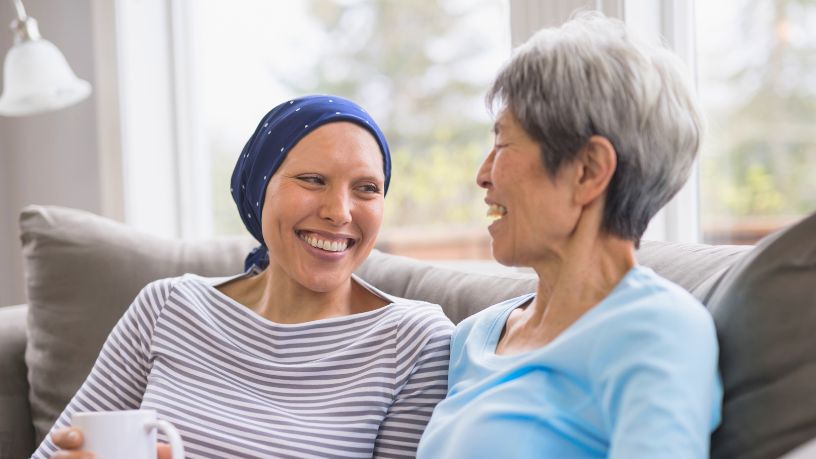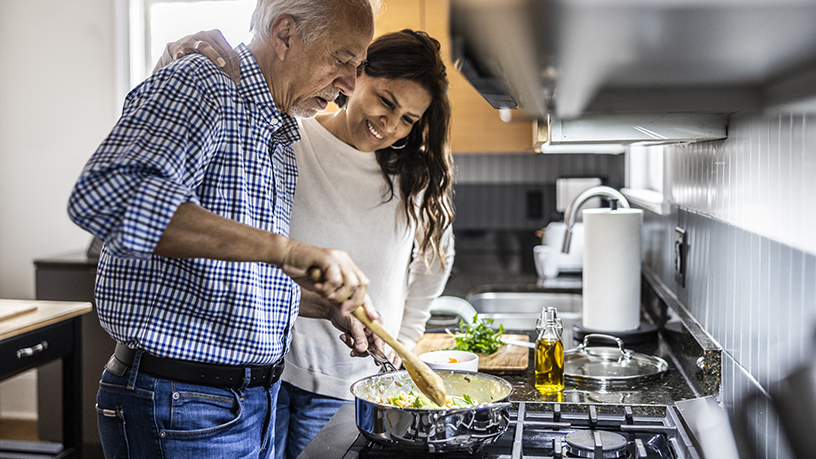On this page
Key takeaways
- Whether by visiting, texting or phoning, it’s important to stay connected with someone who has been diagnosed with cancer, even if you feel sad and anxious.
- Suggest specific ways you would like to offer them practical support rather than leaving it as an open-ended “Let me know how I can help.”
- There’s no single ‘right’ way to offer care and support, but there’s your way.
You’ve just heard the news. Someone you know has been diagnosed with cancer and is about to have surgery or start a gruelling course of treatment.
You want them to know you’re thinking of them, you want to support them, you want to do something, but what? From someone who’s been in both situations, I have a few insights to offer.
There’s no single right way to offer support
When a family member or friend is diagnosed, those early days can be a whirl of emotions. Especially so before you know what it means in terms of treatment and prognosis. Of course you’re thinking of them, but you may also have your own feelings of shock, grief anxiety about the treatment they may have to go through and what it all means for the future.
Sometimes those feelings can make you feel uncertain. There’s a lot to consider, such as should you visit (what would you say anyway?), will you cook them some meals (what if they don’t like them?), can I help with housework or other jobs (will they think I’m interfering?).
My response to those questions is this: remember, it’s not about you or how you feel. It’s about them. Take a deep breath and remember, there’s no single right way to offer support. But there’s your way.
Keeping in contact
It’s important to keep up contact, even if you feel sad or uncomfortable around someone who is unwell.
I was surprised by some people’s reactions after I started cancer treatment. Friends who lived 5 minutes away didn’t contact me for weeks, while one friend who was overseas phoned every couple of days.
You may want to touch base with family or carers before you contact the person having treatment directly, particularly if they’re unwell. At one point in my treatment, my lungs were so inflamed I found talking difficult because I coughed constantly, so I opted not to answer phone calls. However, I appreciated the calls made to my partner to check on me.
There are many ways to stay in contact:
- Texting: I found this great because it required little energy on my part when I felt unwell
- Visiting: check beforehand if they’re well enough. Visits can be low-key, doing ‘normal’ things, such as watching a movie together. Nor do they have to be long; short visits are a welcome diversion
- Invitations: ask them to family and social events, assuring them that it’s absolutely fine to cancel at the last minute. Don’t be offended if they decline an invitation, try again later
- Kind gestures: a card or little gift are thoughtful ways to lift spirits and show you care.
Food for thought
When I wasn’t up to seeing anyone yet, a friend left an insulated bag with a meal at the front door and texted to let us know it was there. She knew I loved her minestrone soup and her legendary vegetable lasagne. What a gift!
Providing meals is helpful. Bupa Health Coach and Dietitian Karyn Chea says there are excellent resources available from the Cancer Council1, to give you ideas about what to cook. Her tips include:
- making freezer friendly meals such as pasta sauces, lasagne, frittatas, soups and casseroles
- finding out their favourite foods or if there is anything they don’t like
- portioning food into single serve containers to make it easier to heat up.
If they are struggling with side-effects such as appetite loss, dry mouth or mouth ulcers, Karyn suggests whipping up a nutritious, delicious and easy-to-digest smoothie for them.
If the person you’re supporting has a family or partner, providing meals (or a tasty batch of muffins) for them is also a great help.
Providing practical support
“Let me know if there’s anything I can do to help you.”
I’ve said it myself, meaning every word. The fact is, though, usually they don’t. People having treatment and their carers have their minds full already, and often there’s little space left to be thinking ahead to plan what might help them tomorrow or the next day.
It’s helpful and thoughtful to come up with your own suggestions of practical ways to offer support, such as:
- picking up things from the supermarket. If you’re out shopping, text them to see if they need anything
- taking the dog for a walk
- looking after their children. (Why not combine 2 tasks and take the kids as well as the dog to the park for a few hours?)
- mowing the lawn, watering the garden, pruning the roses or weeding. It’s depressing to see your garden looking uncared-for
- helping with housework
- driving them to appointments
- sitting with them while they’re having treatment.
It’s also helpful to be specific with your offers of support.
Can I bring you dinner on Thursday?
Would you like me to take you shopping next Tuesday?
May I drive you to your next appointment?
Can I vacuum your house while you have treatment next week?
What do you say?
It can be tricky knowing what to say or what not say to someone with cancer. Everyone copes differently, and every day is different. Some days you feel ok, some days you don’t.
However, there are some comments I’m fairly confident (from my experience!) that most people with cancer do not want to hear. Examples include:
- observations about how you look. You don’t want to hear you look tired/drawn/have lost weight. You also don’t want to be told “you don’t look that sick”
- stories about other people who have had cancer
- being encouraged to stay positive or that “everything is going to be all right’
- intrusive questions about your treatment and prognosis.
Obviously, you don’t want to ignore the cancer and treatment your friend or family member is going through, but you don’t want them to feel obliged to talk about it, either.
Everyone is different with how they approach their illness, and a simple ‘How are you feeling today?” gives an option of a short response or the opportunity for them to talk more about it.
Don’t treat them differently. They’re still the same person, so chat about what you normally chat about, what the family is up to, what you’re watching on Netflix, how work is going.
The sobering truth is that statistics show that we are all going to have a close and personal relationship with cancer.
Nearly one in 2 of Aussies will be diagnosed with some form of it during their lifetime2, so either we or someone we love will have the disease. Knowing how to respond in a helpful and positive way is important.
Resources

At Bupa, trust is everything
Our health and wellbeing information is regularly reviewed and maintained by a team of healthcare experts, to ensure its relevancy and accuracy. Everyone's health journey is unique and health outcomes vary from person to person.
This content is not a replacement for personalised and specific medical, healthcare, or other professional advice. If you have concerns about your health, see your doctor or other health professional.
1The Cancer Council. Healthy recipes. The Cancer Council.
2The Cancer Council. (May 2025) Incoming Parliament must act as new data reveals nearly 1 in 2 Australians think the country is unprepared for a rise in cancer diagnoses. The Cancer Council.
You might also like
How to support a loved one through chemotherapy
Caring for a loved one going through chemo can seem like a daunting task, so we've put together a list of simple ways you can help support them.
What to eat when you’re having cancer treatment
You may not feel like eating If you’re having cancer treatment. But a nutritious diet is an important part of your recovery.
How to support a loved one living with breast cancer
Showing up in the right way can make a big difference to someone dealing with a cancer diagnosis or treatment.
Cancer: Treatment types and options
If you or a loved one has been diagnosed with cancer, it helps to understand the different treatment options and how they work.





